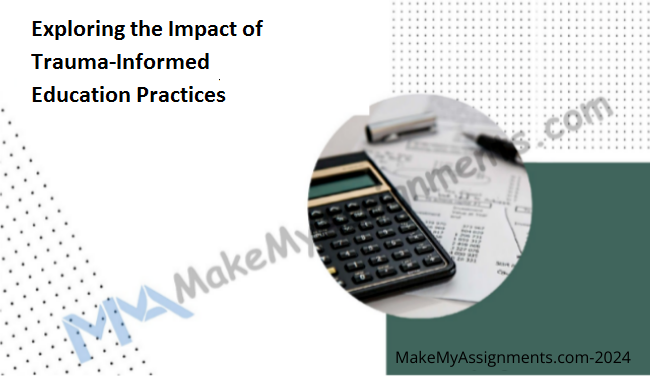
Exploring the Impact of Trauma-Informed Education Practices
In recent years, educators and mental health professionals have increasingly recognized the profound impact of trauma on students’ learning and well-being. Traumatic experiences, such as abuse, neglect, violence, or family instability, can significantly hinder a child’s ability to thrive academically and socially. In response to this understanding, trauma-informed education practices have emerged as a vital framework for creating supportive learning environments that address the needs of all students, especially those who have experienced trauma. This blog delves into the significance of trauma-informed education practices and their transformative impact on students, educators, and school communities.

Understanding Trauma: Before delving into trauma-informed education practices, it’s essential to grasp the nature and effects of trauma. Trauma can manifest in various forms and intensities, ranging from acute incidents to prolonged adversity. Children who have experienced trauma may exhibit a wide array of symptoms, including hyperarousal, hypervigilance, emotional dysregulation, and difficulty forming trusting relationships. These symptoms can profoundly influence their ability to engage in learning activities, interact with peers, and navigate the school environment.
Key Principles of Trauma-Informed Education: Trauma-informed education is grounded in several key principles that guide educators in creating safe, supportive, and nurturing learning environments:
- Safety: Ensuring physical and emotional safety is paramount in trauma-informed schools. This includes implementing clear behavior expectations, fostering positive relationships, and providing structured routines that promote predictability and stability.
- Trustworthiness and Transparency: Building trust is essential for students who have experienced trauma. Educators strive to be reliable, consistent, and transparent in their interactions with students, thereby creating an environment where students feel respected and valued.
- Empowerment and Choice: Trauma-informed educators recognize the importance of empowering students and giving them a sense of agency in their learning. Providing opportunities for choice and autonomy can help students regain a sense of control over their lives and foster resilience.
- Collaboration and Mutual Respect: Collaborative partnerships between educators, students, families, and community members are central to trauma-informed practice. By working together and respecting each other’s perspectives, stakeholders can better support students’ holistic needs.
Impact on Students: Trauma-informed education practices have a profound impact on students’ academic achievement, socio-emotional development, and overall well-being. By creating safe and supportive environments, students feel more comfortable taking academic risks, engaging in learning activities, and forming meaningful connections with peers and educators. Additionally, trauma-informed approaches promote self-regulation skills, emotional awareness, and resilience, equipping students with the tools they need to overcome adversity and succeed in school and beyond.
Impact on Educators: Implementing trauma-informed practices also benefits educators by enhancing their ability to meet the diverse needs of their students and create inclusive learning environments. Educators gain a deeper understanding of trauma and its effects, enabling them to respond with empathy, compassion, and appropriate support. Furthermore, trauma-informed training and professional development opportunities empower educators to refine their teaching strategies, strengthen their relationships with students, and prevent burnout.
Impact on School Communities: Trauma-informed education extends beyond individual classrooms to transform entire school communities. By fostering a culture of empathy, understanding, and resilience, schools become havens of support where all members feel valued and respected. Moreover, trauma-informed approaches promote equity and social justice by addressing the underlying factors that contribute to disparities in educational outcomes, such as poverty, racism, and inequitable access to resources.
MakeMyAssignments (MMA) is committed to supporting students’ academic success by providing personalized, high-quality assignment assistance services. In alignment with trauma-informed education practices, MMA recognizes the importance of creating a safe, supportive, and inclusive learning environment for all students, including those who have experienced trauma. This blog explores how MMA integrates trauma-informed principles into its services to empower students and promote their holistic well-being.
Creating Safe and Supportive Spaces: At MMA, creating safe and supportive spaces for students is a top priority. Recognizing that students may be navigating various challenges, including trauma, our platform is designed to foster a sense of safety and belonging. Our customer support team is trained to interact with empathy, respect, and understanding, ensuring that students feel comfortable seeking assistance with their assignments without fear of judgment or stigma.
Empowering Students Through Choice and Autonomy: Trauma-informed education emphasizes the importance of empowering students and giving them a sense of agency in their learning. At MMA, students have the freedom to choose the type of assistance they need, whether it’s help with research, writing, editing, or formatting. By providing students with options and autonomy, we empower them to take ownership of their academic journey and build confidence in their abilities.
Building Trust and Rapport: Building trust and rapport is essential for students who have experienced trauma. MMA prioritizes building positive relationships with students through transparent communication, reliability, and consistency. Our team of experienced academic experts is dedicated to establishing trust with students by delivering reliable, high-quality assistance tailored to their individual needs and preferences.
Understanding and Addressing Students’ Needs: MMA understands that students’ needs vary, and some may require additional support due to trauma or other challenges. Our platform offers flexible scheduling options, allowing students to access assistance at their convenience. Moreover, our customer support team is trained to recognize signs of distress and provide appropriate referrals to resources for students in need of further support.
Promoting Academic Success and Well-Being: By providing comprehensive assignment assistance services, MMA supports students in achieving their academic goals while promoting their overall well-being. Our team of subject matter experts helps students improve their academic performance, develop critical thinking skills, and enhance their understanding of course materials. Additionally, by alleviating the stress and pressure associated with academic deadlines, MMA contributes to reducing students’ anxiety and promoting a healthier approach to learning.
MakeMyAssignments is committed to supporting trauma-informed education by providing students with personalized, high-quality assignment assistance services in a safe, supportive, and inclusive environment. Through our dedication to building trust, empowering students, and understanding their individual needs, we aim to contribute to students’ academic success and well-being. By partnering with schools and educators to promote trauma-sensitive practices, MMA strives to create a brighter future for all students, regardless of their past experiences or challenges they may face.



